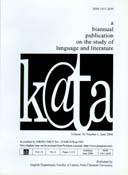World Literature: A Panacea for the Colonial Prejudice of English Literature
Abstract
The present study is an attempt to discuss the importance of “World Literature” for English literary studies in universities and societies around the world. In this regard, this paper shall refer to the stances adopted by various thinkers against the colonial and ideological essence of the English literature in developing countries. In this part, references are made to postcolonial thinkers and the way they have exposed the barbaric nature of colonialism, in that it has, for decades, marginalized the culture and literature of other nations through cultural (neo)colonialism. The next part offers a brief introduction to the history of the emergence of “World Literature” and the ways in which it contributes to bridging the gap between nations across continents and ideological divides. The final section is devoted to a recapitulatory remark vis-à-vis the reorientation of the public’s eyes towards “World Literature” as a panacea for the colonial prejudice of English literature.
Downloads
References
Anushiravani, A. (2015). “Amuzesh-e Adabiat-e Englisi ya Adabiat-e Jahan be Englisi dar Daneshgah-ha-ye Iran?” (The pathology of teaching English literature in Iran). Pazhuhesh-e Adabiat-e Moaser-e Jahan, vol. 19, no. 1, pp. 25 – 43. Retrieved from https://jor.ut.ac.ir/article_52049.html.
Ashcroft, B., Helen T., and Gareth G. Eds. (1995). The Post-Colonial Studies Reader, London & New York: Routledge.
Ashoori, Dariush. (2006). Us and Modernity. Tehran: Serat Culturall Institute.
Bhabha, H. K. (1994). The Location of Culture. London: Routledge.
Brydon, D. (2015). “Nguigi wa Thiong’o ‘On the Abolition of the English Department’ 1972.” Association of Canadian College and University Teachers of English. 41: 4, 3.
Crocco, F. (2014). Literature and the Growth of British Nationalism: The Influence of Romantic Poetry and Bardic Criticism. Jefferson: McFarland.
Cuddon, J. A. (2013). A Dictionary of Literary Terms and Literary Theory. 5th ed. Hoboken, New Jersey: Wiley-Blackwell.
Damrosch, D. (2003). What is World Literature?. Princeton and Oxford: Princeton UP.
D’haen, T, Damrosch D, and Djelal Kadir. (2011). The Routledge Companion to World Literature. London & New York: Routledge.
Domínguez, C., Saussy H., and Villanueva D. (2015). Introducing Comparative Literature: New Trends and Applications. London and New York: Routledge.
Eagleton, T. (2008). Literary Theory: An Introduction. Hoboken: John Wiley & Sons.
Eckermann, J. P. (2011). Conversations of Goethe With Eckermann and Sorret. (Trans.) John Oxenford. UK: Cambridge University Press.
Gandhi, L. (1998). Postcolonial Theory: A Critical Introduction. Australia: Allen & Unwin.
Greenblatt, S., (edited.). (2006). The Norton Anthology of English Literature. 8th ed. Vol. B. New York: Norton.
Hegel, G.W. F. (1998). Hegel Reader, (edited.) Stephen Houlgate. UK: Blackwell Publishing Ltd.
Javidshad, M. (2018). “Analysis of Canonical Works in Two Versions of the Norton Anthology of English Literature.” Literary Criticism. 10: 40: 167 – 184. Retrieved from http://lcq.modares.ac.ir/article-29-22979-fa.html.
Jost, F. (1974). Introduction to Comparative Literature. Indianapolis and New York: Pegasus.
Kruger, M. J. (2012). Canon Revisited: Establishing the Origins and Authority of the New Testament Books. Wheaton, Illinois: Crossway.
Macaulay, T. B. (1965). “Selections from Educational Records”.
Moretti, F. (2000). “Conjectures on World Literature.” New Left Review. Issue 1, 54 – 68.
Puncher, M. (2006). Poetry of the Revolution: Marx, Manifestoes and the Avant-gardes. Princeton and Oxford: Princeton University Press.
Robertson, R. (2016). Goethe: A Very Short Introduction. Oxford: Oxford University Press.
Roebuck, J. A. (1849). The Colonies of England. New York: New York Public Library.
Said, E. W. (1978). Orientalism. New York: Pantheon Books.
Said, E. W. (1983). The World, The Text, and the Critic. Cambridge, Massachusetts: Harvard University Press.
Sinfield, A. (1992). Faultlines: Cultural Materialism and the Politics of Dissident Reading. Oxford: Clarendon Press.
Trivedi, P. (2017). “Shakespeare and Asian Classics.” Sean Keilen & Nick Moschovakis (Eds.), The Routledge Research Companion to Shakespeare and Classical Literature. London: Routledge.
Vafa, A. (2016). Recasting American and Persian Literatures: Local Histories and Formative Geographies from Moby-Dick to Missing Solouch. United Kingdom: Palgrave Macmillan.

This work is licensed under a Creative Commons Attribution 4.0 International License.
This work is licensed under a Creative Commons Attribution License





















